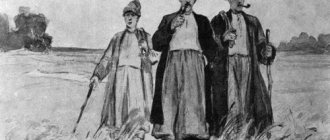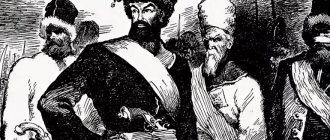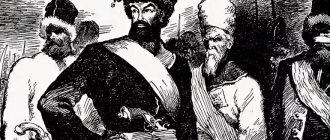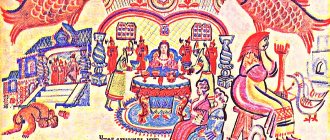(Illustrated: figuratively on theme, painting by artist William Powell Freight)
The beginning of the 30s is a new period in the work of A.S. Pushkin, marked by a transition from romantic themes and lyrics to realism and prose. One of the harbingers of the new stage was the novel “Dubrovsky”. The work was not completed, the last entry in the manuscript dates back to 1932, and it was published only in 1841 after the death of the author. The title was given by the publisher.
In Dubrovsky, Pushkin raises the question of the possibility of a union of the two most numerous classes - the nobility and the peasantry, which is necessary for the future of the country. The novel vividly describes the realities of time. The author sought to show the main character as a typical representative of the young nobility, and the plot as characteristic of Russia, where money and connections trample on the rule of law and honor. Pushkin raised the theme of “Dubrovsky” in his next major work, “The Captain’s Daughter.”
Popular books
Total 1K
- Direct personShareBuy
- Incredible. The story of a crime that no one believed ShareBuy
- Empty HillsShareBuy
- The same oneShareBuy
- Do not tell anyone. The true story of sisters who grew up with a murderous motherShareBuy
- Quiet guestsShareBuy
- Light up the skiesShareBuy
- Small cafe in CopenhagenShareBuy
- Mara and Morok. Special ShadowShareBuy
- SimonShareBuy
- Echoes of the singing sandsShareBuy
- Dislike of the Gray-Eyed KingShareBuy
- AspidShareBuy
- Eight White NightsShareBuy
- Falling fastShareBuy
- Love is not according to scriptShareBuy
- Wrath of AngelsShareBuy
- Book of AngelsShareBuy
- Checkered notebookShareBuy
- Light between usShareBuy
- Reach for the starsShareBuy
- Gold in the dark nightShareBuy
- White frigateShareBuy
- Runaway SistersShareBuy
- Among a thousand wordsShareBuy
New books
Total 361
- ApolloShareBuy
- Be in love. Study. CreateShareBuy
- I didn't want it that way. They trusted one person, but the entire Internet found out about it. Stories of fighting shaming and harassmentShareBuy
- Trillion Dollar Coach. Leadership principles from legendary Silicon Valley coach Bill CampbellShareBuy
- My neighbor Hayao. Art book based on the work of MiyazakiShareBuy
- Good doctor. How to find your doctor and surviveShareBuy
- Star Wars. The Mandalorian. ArtbookShareBuy
- Wounds. Land of MonstersShareBuy
- Neon KillerShareBuy
- With eyes wide open. 131 ways to see the world differently and find joy in everyday lifeShareBuy
- The girls' last trip. Volume 2ShareBuy
- A sea of memoriesShareBuy
- Emil and Margot. Monsters are everywhere!ShareBuy
- AspidShareBuy
- Autumn CrimeShareBuy
- Ring of Times. Curse of SetShareBuy
- Frankenstein. Forbidden knowledge from the era of the Gothic novelShareBuy
- Absolute accessShareBuy
- The silence of my wordsShareBuy
- This button needs text. About UX writing in a short and clear wayShareBuy
- In Valeria's placeShareBuy
- The battle for Uber. How Travis Kalanick lost the most successful company of the decadeShareBuy
- BrotherhoodShareBuy
- Era of the BearsShareBuy
- People of our yardShareBuy
"Dubrovsky"
- an unfinished robber novel by Alexander Pushkin, written from October 1832 to February 1833 and published in 1841.
Minor Character Quotes
(Illustration: Kustodiev “Dubrovsky”. Hunting. 1919)
“How, Your Excellency, his papers were burned! what's better for you? “In this case, please act according to the laws, and without any doubt you will receive your complete pleasure.”
- Shabashkin . The character talks with Tretyakov about the possibility of depriving Dubrovsky of his legal estate. The author shows how omnipotent wealth and influence are, which make it possible to interpret laws in someone else's favor.
“The master, listen, did not get along with Kiril Petrovich, and he filed a lawsuit - although he is often his own judge. It’s not our serf’s business to sort out the master’s wills, but by God, your father went against Kiril Petrovich in vain, you can’t break a butt with a whip.”
— Kucher Anton . The hero tells Vladimir about the conflict between Troekurov and his father. The impunity and omnipotence of the rich landowner and the acceptance of this by the people for granted are emphasized.
“When you see him, fear and trembling and sweat dripping, but your back itself just bends and bends...”
- Sexton . The hero talks about Troyekurov after the funeral of the elder Dubrovsky. The slavish psychology of the majority allows tyrants like Troekurov to be willful.
“Why are you laughing, you devils,” the blacksmith told them angrily. “You are not afraid of God: God’s creation is perishing, and you are foolishly rejoicing.”
- Blacksmith Arkhip . The hero saved the cat, although he had previously doomed the officials to death. The common people hate employees who indulge in deceit and injustice. The dark soul of the peasant combines the desire to kill a person and pity for a weak creature, a frantic faith in God and the desire to live as a thief.
“... and for the litigation of the deceased Andrei Gavrilovich. Was it not I, for your pleasure, that is, in conscience and justice, who showed that the Dubrovskys own Kistenevka without any right to do so, but solely out of your condescension?
— Anton Pafnutich . The hero talks about perjury at Troekurov’s dinner party. Society has abandoned ideals and values; even public admission of crime and meanness does not cause condemnation.
QuotesEdit
| “I have a neighbor,” said Troekurov, “a small-time rude man; I want to take his estate. What do you think about that? - Your Excellency, if there are any documents or... - You’re lying, brother, what documents do you need? There are decrees for that. This is the power to take away property without any right. - Chapter I |
| “The gentlemen come to pay homage to him, and to say that it would be a trough, but there will be pigs [1]. - Chapter III |
| ... Vladimir recognized Arkhip the blacksmith. <…> - Why do you have an ax with you? - Why the ax? But how can you walk without an axe? These clerks, you see, are such mischievous people - just look... - You're drunk, drop the ax and go get some sleep. - I'm drunk? Father Vladimir Andreevich, God knows, there wasn’t a single drop in my mouth... and will the wine come to mind, has the matter been heard, the clerks are planning to take over us, the clerks are driving our masters out of the master’s courtyard... - Chapter VI |
| ... the cat ran along the roof of the burning barn, wondering where to jump; Flames surrounded her on all sides. The poor animal called for help with a pitiful meow. The boys died laughing, looking at her despair. “Why are you laughing, you devils,” the blacksmith told them angrily. “You are not afraid of God: God’s creation is perishing, and you are foolishly rejoicing,” and, placing the ladder on the fire roof, he climbed after the cat. - Chapter VI |
| A bear that had been petted would sometimes be locked in an empty room, tied with a rope to a ring screwed into the wall. The rope was almost the length of the entire room, so that only the opposite corner could be safe from the attack of a terrible beast. They usually brought the newcomer to the door of this room, accidentally pushed him towards the bear, the doors were locked, and the unfortunate victim was left alone with the shaggy hermit. The poor guest, with his shirt torn and scratched to the point of blood, soon found a safe corner, but was sometimes forced to stand pressed against the wall for three whole hours and see how the enraged beast, two steps away from him, roared, jumped, reared, tore and struggled until reach him. Such were the noble amusements of the Russian master! A few days after the teacher’s arrival, Troekurov remembered him and intended to treat him in the bear’s room: for this purpose, calling him one morning, he led him along dark corridors; suddenly the side door opened, two servants pushed the Frenchman into it and locked it with a key. Having come to his senses, the teacher saw a tied bear, the animal began to snort, sniffing its guest from afar, and suddenly, rising on its hind legs, walked towards him... The Frenchman was not embarrassed, did not run and waited for the attack. The bear approached, Desforges took a small pistol out of his pocket, put it in the hungry beast’s ear and fired. The bear fell down. Everyone came running, the doors opened, Kirila Petrovich entered, amazed at the outcome of his joke. Kirila Petrovich certainly wanted an explanation for the whole matter: who told Deforge about the joke prepared for him, or why he had a loaded pistol in his pocket. <...> “I have not heard of a bear,” answered Desforges, “but I always carry pistols with me, because I do not intend to endure an insult for which, according to my rank, I cannot demand satisfaction.” <…> Kirila Petrovich did not answer anything, he ordered to pull out the bear and skin it; then, turning to his people, he said: “What a fellow! I didn’t chicken out, by God, I didn’t chicken out.” From that moment he fell in love with Deforge and never thought of trying him. - Chapter VIII |
| Oh yes paper! Based on these signs, it will not be surprising for you to find Dubrovsky. But who is not of average height, who does not have brown hair, a straight nose, and brown eyes? I bet you will talk to Dubrovsky himself for three hours straight, and you won’t guess with whom God brought you together. - Chapter IX |
| — Troekurov |
| - ... luxury consoles only poverty, and then out of habit for one moment;.. - Chapter XV |
Quotes from the novel “Dubrovsky” (160 quotes)
The novel “Dubrovsky” by A.S. Pushkin is the most famous Russian robber novel, created in the spirit of a genre of literary composition popular in England, France and Germany in the 18th-19th centuries, in the center of which is the image of a noble robber. The novel is based on the idea of the moral decay of the Russian nobility and its opposition to the common people. Themes of defense of honor, family lawlessness, and peasant revolt are revealed. This collection contains the best quotes from the novel “Dubrovsky”.
Perhaps she was not yet in love, but at the first accidental obstacle or sudden persecution of fate, the flame of passion was bound to flare up in her heart.
Vladimir Dubrovsky was brought up in the Cadet Corps and was released as a cornet into the guard; his father spared nothing for his decent maintenance, and the young man received more from home than he should have expected. Being wasteful and ambitious, he allowed himself luxurious whims, played cards and went into debt, not caring about the future and envisioning sooner or later a rich bride, the dream of his poor youth.
Luxury consoles only poverty, and then out of habit for a moment.
He is 23 years old, of average height, has a clean face, shaves his beard, has brown eyes, light brown hair, and a straight nose. Special signs: there were none.
We have some whistling, some not: but there’s still no money.
Where there was a table of food, there is a coffin.
Get away from evil and do good, but you can’t sew a button on someone else’s mouth.
Confident of her affection, he could never gain her trust.
The gentlemen come to pay homage to him, and to say that it would be a trough, but there will be pigs.
Marriage frightened her like a chopping block, like a grave.
This is the power to take away without any right.
A person who does not obey the laws of reason and is accustomed to following the suggestions of passions often errs and exposes himself to late repentance.
You need to know that I was not preparing to be a teacher, but a confectioner, but I was told that in your land the title of teacher is much more profitable...
Everyone envied the harmony that reigned between the arrogant Troekurov and his poor neighbor, and were surprised at the courage of this latter when, at Kiril Petrovich’s table, he directly expressed his opinion, not caring whether it contradicted the opinions of the owner. Some tried to imitate him and go beyond the limits of proper obedience, but Kirila Petrovich frightened them so much that he forever discouraged them from making such attempts, and Dubrovsky alone remained outside the general law. An unexpected incident upset and changed everything.
She did not get confused with silks, like Conrad's mistress, who, in amorous absent-mindedness, embroidered a rose with green silk.
For a poor nobleman, such as he is, it is better to marry a poor noblewoman and be the head of the house than to become the clerk of a spoiled woman.
Never will a crime be committed in your name. You must be clean even of my crimes.
“If you decide to resort to me,” he said, “then bring the ring here, lower it into the hollow of this oak tree, I will know what to do.”
He quietly hugged her slender figure and quietly drew her to his heart.
My gracious sir, I do not intend to go to Pokrovskoye until you send me the huntsman Paramoshka to confess; but it will be my will to punish him or have mercy, but I do not intend to tolerate jokes from your servants, and I will not tolerate them from you either - because I am not a jester, but an old nobleman. – For this reason I remain obedient to the services of Andrei Dubrovsky.
Where the table was, there the coffin stands.
There would be a trough, but there would be pigs.
I wanted to know his opinion about everything and always agreed with him.
There were fewer cavaliers, as everywhere else where some uhlan brigade was not stationed, than ladies; all the men who were fit for duty were recruited.
Dubrovsky held an open book in his hand, but his eyes were closed.
Only Dubrovsky was silent and frowned. He was an ardent hunter. His condition enabled him to keep only two hounds and one pack of greyhounds; he could not help but feel a little envy at the sight of this magnificent establishment.
Luxury consoles only poverty, and then out of habit for a moment.
No! No! Let him not get the sad house from which he drives me out.” Vladimir clenched his teeth, terrible thoughts were born in his mind.
We may lose the property to which we have an indisputable right.
So, it's all over, he said to himself; – in the morning I had a corner and a piece of bread. Tomorrow I will have to leave the house where I was born and where my father died, to the culprit of his death and my poverty.
You can't break the butt with a whip.
He lost his mother from an early age and, almost not knowing his father, was brought to St. Petersburg in the eighth year of his age; with all that, he was romantically attached to him and loved family life the more, the less he had time to enjoy its quiet joys.
Father Vladimir Andreevich, God is my witness, there wasn’t a single drop in my mouth... and whether the wine comes to mind, has the matter been heard - the clerks are planning to take over us, the clerks are driving our masters out of the master’s courtyard... Oh, they snore, damned ones; all at once, and it would end up in the water.
Dubrovsky's sudden madness had a strong effect on his imagination and poisoned his triumph.
Being wasteful and ambitious, he allowed himself luxurious whims; He played cards and went into debt, not caring about the future and envisioning sooner or later a rich bride, the dream of his poor youth.
You can't sew buttons on someone else's mouth.
Where there was a table of food, there is a coffin.
Being the same age, born in the same class, raised the same, they were somewhat similar in character and inclinations. In some respects, their fate was the same: both married for love, both were soon widowed, both had a child.
The gentlemen come to bow to him, and to say that it would be a trough, but there will be pigs.
Kirila Petrovich sent a French teacher from Moscow for his little Sasha, who arrived in Pokrovskoye during the incidents we are now describing.
Perhaps she was not yet in love, but at the first accidental obstacle or sudden persecution of fate, the flame of passion was bound to flare up in her heart.
No, no,” she repeated in despair, “it’s better to die, it’s better to go to a monastery, it’s better to marry Dubrovsky.”
Luxury consoles only poverty, and then out of habit for a moment.
The prince was about fifty years old, but he seemed much older. Excesses of all kinds exhausted his health and left their indelible mark on him. Despite this, his appearance was pleasant and remarkable, and his habit of always being in society gave him a certain courtesy, especially with women. He had a constant need for distraction and was constantly bored.
Confident of her affection, he could never gain her trust.
Having become accustomed to absent-mindedness, he could not bear solitude and on the third day after his arrival he went to dine with Troekurov, whom he had once known.
I do not dare to fall at your feet, thank heaven for an incomprehensible undeserved reward. Oh, how I should hate him... but I feel that now there is no place for hatred in my heart.
The funeral will be richer and there will be more guests, but who cares to God!
- You're lying, brother, what kind of documents do you need? There are decrees for that. This is the power to take away property without any right.
I couldn't help but feel a little jealous.
I will not touch him, your will is sacred to me.
The impatience and determination of his character.
Brought up the same, they were similar.
Luxury consoles one poverty, and then from habit to one.
Theirs was the same: both married for love, both.
The thought of losing his father painfully tormented his heart, and the situation of the poor patient, which he guessed from his nanny’s letter, terrified him. He imagined his father abandoned in a remote village, in the hands of a stupid old woman and servants, threatened by some kind of disaster and dying without help in physical and mental torment. Vladimir reproached himself for criminal negligence. For a long time he did not receive letters from his father and did not think to inquire about him, believing him to be traveling or doing household chores.
You are shameless, really, shameless!
Vladimir Dubrovsky re-read these rather stupid lines several times in a row with extraordinary excitement. He lost his mother from an early age and, almost not knowing his father, was brought to St. Petersburg in the eighth year of his age; with all that, he was romantically attached to him and loved family life the more, the less he had time to enjoy its quiet joys.
The maids came running, undressed her, forcibly managed to calm her down with cold water and all kinds of alcohols, they laid her down, and she fell into a sleepy state.
Everyone envied the harmony that reigned between the arrogant Troekurov and his poor neighbor, and were surprised at the courage of this latter when, at Kiril Petrovich’s table, he directly expressed his opinion, not caring whether it contradicted the opinions of the owner.
You need to know that I was not preparing to be a teacher, but a confectioner, but I was told that in your land the title of teacher is much more profitable...
He treated peasants and servants strictly and capriciously; despite this, they were devoted to him: they were vain of the wealth and glory of their master and, in turn, allowed themselves a lot in relation to their neighbors, hoping for his strong patronage.
“Why are you laughing, you little devils,” the blacksmith told them angrily. “You are not afraid of God: God’s creation is dying, and you are foolishly rejoicing.”
Despite the extraordinary strength of his physical abilities, he suffered from gluttony twice a week and was tipsy every evening.
Well, children, goodbye, I’m going wherever God leads; be happy with your new master.
At that moment you passed by me like a heavenly vision, and my heart was humbled.
Do not be afraid, sir, I will ask him. He won't hurt us. We are all his children. How will he stand up for you if you start rebelling and robbing?
I hope that you will not make me repent of my leniency.
Get away from evil and do good,” said the priest, “there is no point in us staying here.” It's not your problem, no matter how it ends.
Children, goodbye, I’m going wherever God leads.
“We’ve heard of it, Your Excellency,” he continued, “hunters are bringing dogs into God’s church!” dogs are running around the church. I'll teach you a lesson...
But Marya Kirilovna met them in the hall, and the old red tape was struck by her beauty. Troekurov seated the guest next to her. The prince was enlivened by her presence, was cheerful and managed to attract her attention several times with his curious stories.
I gave up revenge as if it were madness.
No, Kirila Petrovich: my Volodka is not Maria Kirilovna’s fiancé. For a poor nobleman, such as he is, it is better to marry a poor noblewoman and be the head of the house than to become the clerk of a spoiled woman.
She indulged in this fascinating habit with more and more trust.
The speech of young Dubrovsky, his sonorous voice and majestic appearance produced the desired effect.
Several times he circled with Marya Kirilovna - and the young ladies mockingly noticed them.
Then a light whistle was heard, and Dubrovsky fell silent. He grabbed her hand and pressed it to his burning lips. The whistle was repeated.
They didn’t understand what had happened to him, and Kirila Petrovich decided that he had eaten too much.
Suddenly he raised his head, his eyes sparkled, he stamped his foot, pushed the secretary with such force that he fell, and, grabbing an inkwell, threw it at the assessor.
You have become rich under my command, each of you has the appearance with which you can safely get into some remote province and spend the rest of your life there in honest labor and abundance.
“I agreed, I swore an oath,” she objected firmly, “Prince is my husband, order him to be released and leave me with him.” I didn't cheat. I waited for you until the last minute... But now, I tell you, it’s too late. Let us in.
She answered nothing. She saw these words as a preface to the expected recognition.
Where there was a table of food, there is a coffin.
A small suitcase, skinny proof of not very sufficient wealth.
And others scattered through the forest or lay down to sleep, according to Russian custom.
He fell silent, fatigue and the wine fumes little by little overcame his timidity, he began to doze, and soon a deep sleep completely took possession of him.
Excuse me,” said Dubrovsky, “my name is, a minute can destroy me.” - He went out.
Only one person did not participate in the general joy.
Pafnutich opened his eyes and, in the pale light of the autumn morning, saw Deforge in front of him: the Frenchman was holding a pocket pistol in one hand, and with the other he was unfastening the treasured bag. Anton Pafnutich froze. “Kes ke sé, monsieur, kes ke sé?” [7] he said in a trembling voice. “Hush, be silent,” answered the teacher in pure Russian, “be silent, or you are lost.” I am Dubrovsky.
To be vain about everything that surrounded him.
They looked at each other proudly, and Dubrovsky noticed an evil smile on his opponent’s face.
Tomorrow I will have to leave the house where I was born and where my father died, to the culprit of his death and my poverty.
Troekurov, arrogant in relations with people of the highest rank, respected Dubrovsky, despite his humble state.
Driven by anger and despair.
In his home life, Kirila Petrovich showed all the vices of an uneducated person. Spoiled by everything that surrounded him, he was accustomed to giving full rein to all the impulses of his ardent disposition and all the ideas of his rather limited mind. Despite the extraordinary strength of his physical abilities, he suffered from gluttony twice a week and was tipsy every evening.
She got used to hiding her feelings and thoughts from him, because she could never know for sure how they would be received.
Satisfied vengeance and lust for power drowned out to some extent nobler feelings, but the latter finally triumphed.
She did not pay any attention to the young Frenchman, brought up in aristocratic prejudices; the teacher was for her a kind of servant or artisan, and the servant or artisan did not seem like a man to her.
Get away from evil and do good.
“He didn’t know anything, just like me.”
He went deeper into the thicket of trees, trying to drown out his spiritual grief with movement and fatigue.
An artisan, but the servant or the artisan did not seem like a man to her.
Get away from evil and do good.
“Could you really think that I wouldn’t remind you of them myself?”
Perhaps the funeral will be richer and there will be more guests, but does God care?
You look at me like a child from an anti-alcohol poster: “Dad, don’t drink!”
I crossed the threshold of my house for the last time.
In his home life, Kirila Petrovich showed all the vices of an uneducated person.
He tried to talk to him, but his thoughts were confused in his head, and the words had no connection.
“No,” he answered sternly, “the kennel is wonderful, it’s unlikely that your people will live the same as your dogs.” One of the hounds was offended. “We don’t complain about our life,” he said, “thanks to God and the master, and what’s true is true; it wouldn’t be a bad thing for another nobleman to exchange his estate for any local kennel. He would have been more nourished and warmer.
He fell silent and indulged in thought again.
I gave up revenge as if it were madness.
The prince, without losing his presence of mind, took a traveling pistol from his side pocket and shot at the masked robber. The princess screamed and covered her face with both hands in horror. Dubrovsky was wounded in the shoulder, blood appeared. The prince, without wasting a minute, took out another pistol, but he was not given time to shoot, the doors opened, and several strong hands pulled him out of the carriage and snatched the pistol from him. Knives flashed above him.
The judges, who hoped for his gratitude, did not receive a single friendly word from him.
Like a light shadow, the young beauty approached the place of the appointed meeting.
They were surprised at one thing - Troekurov’s estates were spared; the robbers did not rob a single barn from him, did not stop a single cart. With his usual arrogance, Troekurov attributed this exception to the fear that he knew how to instill in the entire province, as well as the excellent police force he had established in his villages.
He showed all the vices of an uneducated person.
Dubrovsky frowned. “Listen, Arkhip,” he said, after a short silence, “this is not the case you started. The clerks are not to blame. Light the lantern and follow me.
I realized that the house where you live is sacred, that not a single creature connected with you by blood ties is subject to my curse.
“Vanity of vanities,” said the priest, “and they will sing eternal memory to Kiril Petrovich, just like now for Andrei Gavrilovich, perhaps the funeral will be richer and more guests will be called, but who cares to God!”
It would not be difficult to put a person so ardent and imprudent in the most disadvantageous position.
Circumstances require... I must leave you,” he finally said, “you may soon hear... But before parting, I must explain myself to you...
And of course, master: listen, he doesn’t give a damn about the assessor, the police officer is on his errands. The gentlemen come to pay homage to him, and to say that it would be a trough, but there will be pigs.
Dubrovsky alone remained outside the general law. An unexpected incident upset and changed everything.
Her curiosity was greatly aroused. She had been waiting for recognition for a long time, wanting and fearing it. She would have been pleased to hear confirmation of what she suspected, but she felt that it would be indecent for her to hear such an explanation.
God forbid and deliver: he sometimes has a bad time with his own people, but if he gets strangers, he will tear off not only the skin, but also the meat from them.
He was not selfish by nature; the desire for revenge led him too far.
Do what you want,” Dubrovsky answered them dryly, “I’m no longer the boss here.” - With this word, he retired to his father’s room and locked the door behind him.
To knit!" - the same voice shouted, - and the crowd began to press... “Stop,” Dubrovsky shouted. - Fools! what are you? you are ruining both yourself and me. Go through the yards and leave me alone. Do not be afraid, sir, I will ask him. He won't hurt us. We are all his children.
Kirila Petrovich, left alone, began to pace back and forth, whistling: “Roll the thunder of victory,” which always meant an extraordinary excitement of thoughts in him.
Tomorrow I will have to leave the house where I was born and where my father died, to the culprit of his death and my poverty.
Satisfied vengeance and lust for power drowned out to some extent nobler feelings, but the latter finally triumphed.
Dubrovsky set the fuse, the shot was successful: one had his head blown off, two were wounded.
When leaving the grove, we saw the Kistenevsky wooden church and a cemetery shaded by old linden trees.
The prince, without losing his presence of mind, took a traveling pistol from his side pocket and shot at the masked robber.
Stop,” Dubrovsky shouted. - Fools! what are you? you are ruining both yourself and me. Go through the yards and leave me alone. Do not be afraid, sir, I will ask him. He won't hurt us. We are all his children. How will he stand up for you if you start rebelling and robbing?
Alone with his young wife, the prince was not at all embarrassed by her cold appearance. He did not bother her with sugary explanations and funny delights; his words were simple and did not require answers.
The voices of the clerks reached him, they bossed him around, demanded this and that, and unpleasantly entertained him in the midst of his sad thoughts. Finally everything calmed down.
Kirila Petrovich thought, pacing around the room and angrily whistling the Thunder of Victory.
“I wanted... I came... to see if everyone was at home,” Arkhip answered quietly, stuttering. - Why do you have an ax with you?
The thought of losing her is too heavy for him and he is unable to agree to his death.
Eh, they snore, damned ones; all at once, and it would end up in the water.
Wait,” he said to Arkhip, “it seems that I locked the doors to the hallway in a hurry, go and unlock them quickly.”
He was not at all moved by the frankness of his bride. On the contrary, he saw the need to speed up the wedding and for this purpose considered it necessary to show the letter to his future father-in-law.
Kiril Petrovich liked this teacher with his pleasant appearance and simple manner.
It was cold and forced. The prince did not care about that. He didn’t bother about love, content with her silent consent.
Masha did not pay any attention to the young Frenchman, brought up in aristocratic prejudices.
Imagining myself to be the wife of an old prince; he suddenly seemed disgusting and hateful to her... marriage frightened her like a scaffold, like a grave... “No, no,” she repeated in despair, “it’s better to die, it’s better to go to a monastery, I’d rather marry Dubrovsky.
What a great guy! I didn’t chicken out, by God, I didn’t chicken out.
Troekurov was extremely pleased with him, for he accepted the prince’s tous les frais as signs of respect and desire to please him.
I heard that Dubrovsky attacks not just anyone, but famous rich people, but even here he shares with them, and does not rob completely, and no one accuses him of murder; Is there any trickery here, order your clerk to be called.
He spoke about the paintings not in the conventional language of a pedantic connoisseur, but with feeling and imagination. Marya Kirilovna listened to him with pleasure.
Everyone listened in silence to Anna Savishna's story, especially the young lady. Many of them secretly wished him well, seeing him as a romantic hero, especially Marya Kirilovna, an ardent dreamer, imbued with the mysterious horrors of Radcliffe.
And the proud Troekurov promised, for, having respected the princely dignity, two stars and three thousand souls of the family estate, he to some extent considered Prince Vereisky to be his equal.
I don’t know, and certainly not Dubrovsky. I remember him as a child; I don’t know if his hair turned black, and then he was a curly, blond boy, but I know for sure that Dubrovsky is five years older than my Masha and that, consequently, he is not thirty-five years old, but about twenty-three.
The prince was about fifty years old, but he seemed much older. Excesses of all kinds exhausted his health and took their toll on him.
She began to understand her own heart and admitted, with involuntary annoyance, that it was not indifferent to the merits of the young Frenchman.
There would be a trough, but there would be pigs.
Guys, knit!” - the same voice shouted, - and the crowd began to press forward.
- Dubrovsky, you're dead! “I hear it from the corpse.”
About the novelEdit
| This is one of the greatest creations of the genius of Pushkin. In terms of fidelity of colors and artistic decoration, it is not inferior to “The Captain's Daughter”, and in the richness of content, variety and speed of action it far surpasses it. |
| — Vissarion Belinsky, “Works of Alexander Pushkin. Volumes IX, X and XI", July 1841 |
| "Dubrovsky" is a pendant to "The Captain's Daughter". In both, the pathos of the landowner principle prevails, and the young Dubrovsky is represented as Achilles among people of this kind - a role that Grinev, the hero of The Captain's Daughter, decisively failed. But Dubrovsky, despite all the skill that the author discovered in his portrayal, still remained a melodramatic person and did not arouse participation. In general, this whole story has a strong melodramatic feel. But there are wonderful things in it. The ancient life of the Russian nobility in the person of Troekurov is depicted with terrifying fidelity. Clerks and legal proceedings of that time also belong to the brilliant aspects of the story. The slaves are also excellently outlined. But the best thing is the character of the heroine, predominantly a Russian woman. |
| — Vissarion Belinsky, “Works of Alexander Pushkin,” eleventh and last article, September 1846 |
| ... “The Captain's Daughter” and “Dubrovsky” are excellent stories in the full sense of the word; but indicate what their influence was? where is the school of writers who could be called followers of Pushkin as a prose writer? And literary works are endowed with value not only by their artistic merit, but also (or even more) by their influence on the development of society, or at least literature. |
| — Nikolai Chernyshevsky, “Essays on the Gogol period of Russian literature” (article one), December 1855 |
| “Mermaid”<…> is a reflection of the story of the girl whom the poet “carelessly knocked up.” <…> More than six years after the story that took place in Mikhailovsky, in the same 1832, which marks the first scene of “The Mermaid,” Pushkin wrote “Dubrovsky.” While nursing “wounds of conscience,” he sometimes executed himself in secret, flagellated himself in secret. So in “Dubrovsky,” describing Troyekurov’s “lordly idleness,” he went on and painted a picture that unwittingly resembled something from <…>Pushchin’s story. <…> “We entered nanny’s room, where the seamstresses had already gathered. <…> Among her young team, the nanny walked around grandly with a stocking in her hands.”<…> in the description of Troekurov’s harem, the colors are very condensed. But they are taken from the same stock, from the same palette. This was the execution: Pushkin, invisible to the reader, alone with himself, brought himself closer to Troekurov - and fixed this rapprochement on paper. <…> Another similar rapprochement, and again in connection with the same story, is found in the eighth chapter of “Dubrovsky”, where a completely episodic story is introduced about Mamzel Mimi, “to whom Kirila Petrovich showed great trust and favor, and whom he was finally forced to send to another estate when the consequences of this friendship turned out to be too obvious " If the similarity of the “nanny’s room” with Troekurov’s harem can perhaps be said to be relative and accidental, then it is certainly impossible to assume that by chance, without thinking or remembering a real event in his life, Pushkin could have written the phrase I underlined, in in which this event is depicted absolutely accurately, in full accordance with reality. |
| — Vladislav Khodasevich, “Rusalka”. Assumptions and facts", January 1924 |
| In comparison with “Belkin’s Tales” and “The Queen of Spades,” “Dubrovsky” seems uneven, not transparent enough, and at the same time too long and too short. <…> And in “Dubrovsky” many delightful places attract our attention; but the fact of the matter is that they are attracted, whereas in “Belkin’s Tales” nothing at first catches the eye except the perfection of every thing.[2][3] |
| — Marcel Arlan, “Dubrovsky” |
| In terms of its artistic, and, perhaps, ideological development, it falls into three parts, according to the very course of Pushkin’s work on it. The first volume of the novel is most perfectly processed <…> and the ending <…> is clearly crumpled, hastily sketched when Pushkin was apparently already disappointed in his novel and was thinking about other things. <…> The first part unfolds a deeply dramatic situation of a clash of social forces. <…> But at the center of this part of the novel is the clash between Troekurov and the old Dubrovsky, and both of them are given historically and sociologically. <…> Dubrovsky is, as it were, a person of the Fonvizin type, something like Starodum or other positive heroes of Fonvizin. Troekurov is like Derzhavin’s nobleman, one of those whom Derzhavin opposed in his civil satirical odes. But these images are interpreted as representatives of certain social groups of the era that are hostile to each other. Troekurov is that new nobility that appeared as a result of landowner despotism, favoritism, bureaucratic-police dominance, about which Pushkin spoke so angrily and with such hatred in “My Genealogy”, which was, from his point of view, real and official support royal despotism. Dubrovsky is that true, independent, free and noble Russian nobility, which gave birth to the Decembrists, and gave him himself, Pushkin, impoverished and oppressed, losing power in the state, but not wanting to servile before the authorities. |
| — Grigory Gukovsky, “Pushkin and the problems of the realistic style” (chapter 4), 1948 |
| The prospects for the peasant revolution and the related questions about this or that line of behavior of the progressive minority of the ruling class first arose before Pushkin in all its concreteness and severity in the summer of 1831<...> Pushkin’s thoughts of this time are most closely reflected in the novel “Dubrovsky” < …>. Having come closely in Dubrovsky to the problem of serf relations and the peasant revolution, to the history of a nobleman who betrayed his class, Pushkin could not, however, in the archaic forms of the traditional “robber” novel, concretely and historically comprehend Dubrovsky’s “rebellion” and create the very image of it politically significant and relevant.[4] |
| — Yulian Oksman, “Pushkin at work on “The History of Pugachev,” 1962 |
| In general, it is believed that P. has no failures. And yet “Dubrovsky” is Pushkin’s failure. And thank God he didn't finish it. It was a desire to earn a lot, a lot of money, so as not to think about it anymore. This, in contrast to “Peak. lady”, a thing without Mystery. And he could not live without the Secret. She, she alone, attracted him irresistibly. “Oak,” finished, would have been an excellent “reading book” for that time. <…> I leave three whole lines to list what is there that is tempting for the reader. |
| — Anna Akhmatova, notebook, February 14, 1966 |
Quotes from the main characters
(Illustration by Kustodiev on the theme “Dubrovsky”)
“... I don’t intend to tolerate jokes from your servants, and I won’t tolerate them from you either, because I’m not a jester, but an old nobleman.”
— Andrey Gavrilovich Dubrovsky . Quote from the hero’s note to his friend immediately after a quarrel. Pushkin saw that the nobility in Russia was heterogeneous. Some are faithful to honor and oath, others achieve wealth by serving the stronger, not hesitating to go beyond their conscience. The elder Dubrovsky is a rare example of a nobleman who wished to remain poor but maintain his dignity. Unlike his wealthier neighbors, he considers himself equal to Troekurov and does not allow himself to be humiliated.
“How,” Troekurov thundered, jumping out of bed barefoot, “can I send my people to him to confess, he is free to pardon and punish them! what was he really up to; does he know who he is contacting? Here I am…"
— Kirila Petrovich Troekurov . The hero's reaction to a note from Andrei Gavrilovich Dubrovsky, who asks to send a servant to him. The self-will and thirst for power characteristic of Troekurov find no restrictions in society. He considers himself omnipotent and does not tolerate contradictions from others.
“Tell Kiril Petrovich to get out quickly before I order him to be kicked out of the yard... let’s go.”
— Vladimir Dubrovsky . The hero drives away Troekurov, who decided to make reconciliation. The young man, like his father, does not make a deal with his conscience and is not afraid of a powerful enemy.
“Do not be afraid, sir, I will ask him. He won't hurt us. We are all his children. How will he stand up for you if you start rebelling and robbing?”
— Vladimir Dubrovsky . The hero calms a crowd of peasants who were ready to attack the officials. Vladimir at first does not accept the path of violence, although he understands that he will not achieve justice.
"No! No! Let him not get the sad house from which he drives me out.”
— Vladimir Dubrovsky . The hero reflects on the future in his father’s office, while court officials spend the night in the house. For the first time, the contradictions of real life were revealed to Vladimir. He is used to obeying the laws, but now they contradict justice. He is faced with a choice: accept meanness or rebel.
“Well, children, goodbye, I’m going wherever God leads; be happy with your new master"
— Vladimir Dubrovsky . The hero leaves the estate after the fire. He expresses the position of the old nobility, who considered the peasants not a thing, but their subjects, who need their protection and reasonable management, for whom they are responsible before God and the king.
“... but I always carry pistols with me, because I do not intend to endure an insult for which, according to my rank, I cannot demand satisfaction.”
— Deforge or Vladimir Dubrovsky. The character's words after the incident in the bear room. Vladimir believes that a person, regardless of origin, has the right to respect. Having lost his own name and legal position, he is ready to defend his dignity and honor with arms in hand.
“What a great guy! I didn’t chicken out, by God, I didn’t chicken out.”
- Troekurov. The master admires the courage of the teacher, who killed the bear in cold blood. Troekurov can to some extent be called a victim of order, like a spoiled child who is not denied his desires. Along with vanity, imperiousness, and bad manners, he also has positive qualities. He respects brave, honest people. It was not for nothing that he had a close friendship with the elder Dubrovsky. He also developed a liking for the Frenchman.
“Yes, really, why catch him? Dubrovsky’s robberies are a blessing for police officers: travel, investigations, carts, and money in your pocket.”
- Troekurov. At the festive table, the hero talks with the police officer. Troekurov allows himself to publicly insult government officials. Exposing bribery and carelessness of officials, he himself took advantage of connections and bribery when he deprived the Dubrovskys of their estates.
“I realized that the house where you live is sacred, that not a single creature connected with you by blood ties is subject to my curse. I gave up revenge as if it were madness."
— Vladimir Dubrovsky . The hero explains to Maria Troekurova on their first date. Vladimir retained his humanity even among the robbers; for the sake of love, he was able to overcome his thirst for revenge.
“...dry your tears and come back to us cheerfully. “They all cry when they get engaged,” he continued, turning to Vereisky, “that’s how it is with them... Now, prince, let’s talk about business, that is, about the dowry.”
- Troekurov . The hero's answer to Maria, who does not want to marry the prince. The master is merciless towards his own daughter. For him, a wedding is a good deal.
“No, no,” she repeated in despair, “it’s better to die, it’s better to go to a monastery, it’s better to marry Dubrovsky.”
— Maria Troekurova . The heroine's reaction to the prince's matchmaking. Maria, brought up on novels, dreamed of beautiful mutual love. A marriage of convenience is tantamount to moral death for her.
“For God’s sake, don’t touch him, don’t dare touch him, if you love me - I don’t want to be the cause of some horror.”
— Maria Troekurova . After the prince’s matchmaking, the girl asks Dubrovsky not to touch the groom. The heroine, despite her father’s cruelty, is faithful to the norms of Orthodoxy and morality.
“And when the opportunity opens up for me to press you to my worried heart and say: angel, we will die! poor thing, I must beware of bliss, I must distance it with all my might...”
— Vladimir Dubrovsky . The young man regrets that he lost his name and the opportunity to make Masha Troekurova happy. Their union will be illegal and will bring grief to both. Vladimir feels discord. Circumstances forced him to take the path of crime, but he himself dreams of a happy family life, which he loved so much since childhood.
“I agreed, I swore an oath,” she objected firmly, “Prince is my husband, order him to be released and leave me with him. I didn't cheat. I waited for you until the last minute... But now, I tell you, it’s too late. Let us in."
— Maria Troekurova . Immediately after the wedding, the girl, who became a princess, refuses Dubrovsky. Mary is a true Christian; she cannot step over the oath given in the face of God and violate her duty.
“Think sometimes about Dubrovsky. Know that he was born for a different purpose, that his soul knew how to love you, that he never..."
— Vladimir Dubrovsky . The hero confesses his love to Maria Tretyakova. The words express the tragedy of the character, who is forced to abandon ideals and hopes for the future.
“You have become rich under my command, each of you has the appearance with which you can safely get into some remote province and spend the rest of your life there in honest labor and abundance. But you are all swindlers and probably won’t want to leave your craft.”
— Vladimir Dubrovsky . The hero's speech to the robbers. Vladimir did not become a criminal at heart, he retained the ideals of morality and honor, and wants to share them with the peasants, many of whom are happy with life outside the law. The author shows that the union of the nobility and the common people is doomed.
NotesEdit
- ↑Nikolai Gogol in “Selected Passages from Correspondence with Friends” (XXVIII, 1845) indicated that the latter is a proverb.
- ↑La Nouvelle Revue, 1937, No. 191.
- ↑Translation by I.V. Radchenko / Writers of France on literature. - M.: Progress, 1978. - P. 201.
- ↑A. S. Pushkin. Collected works in 10 volumes. T. 7. History of Pugachev. Historical articles and materials. Memoirs and diaries. - M.: GIHL, 1962. - P. 371-5.
Sources used:
- https://bestcitations.ru/zitati-iz-knig/citaty-dubrovskij
- https://icitata.ru/tsitaty-iz-dubrovskogo/
- https://www.livelib.ru/book/1001579275/quotes-dubrovskij-aleksandr-pushkin
- https://ru.m.wikiquote.org/wiki/Dubrovsky_(novel)








